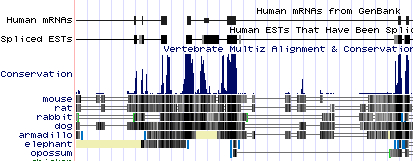Harvard psychologist Steven Pinker's genome is being sequenced as part of the Personal Genome Project, and he's been gazing at the results, attempting to divine some meaning in the A''s, T's, G's and C's. He shares his musings in a Sunday Times Magazine essay that captures both the excitement of personal genomics and its pitfalls.
Personal Genomics and Disease
If someone sequenced your genome, what is the first thing you'd look for? Most of the personal genome services out there are currently focusing their analyses on disease risk. One of the big selling points that these companies are pushing is that you can learn your risk for diabetes, heart disease, high cholesterol, or Alzheimer's, and possibly modify your lifestyle to reduce your risk for disease.
Yet in many cases the information you learn from your genome is not very useful, at least given the current state of the science. Pinker's results illustrate the most common problem. One genetic variant in his genome suggests that he has a reduced risk for prostate cancer - good news! But he has two other variants (in different genes) associated with an increased risk for prostate cancer. So what is his real risk?

Steven Pinker of Harvard
Scientists have no clue. We don't know how those three different variants in Pinker's genome act together. Do we just add up the risk associated with each gene to estimate Pinker's total risk? Or is there some kind of multiplier effect, in which one genetic variant greatly enhances the effect of another? When we say that a particular genetic variant gives you an increased risk for prostate cancer or some other disease, the unstated assumption is that we neglect the effect of all other genetic factors: all other things being equal, you may have a 20% chance of developing prostate cancer if you possess a certain genetic variant. But all else is not equal, and with our current knowledge we can't reliably tell you what your genetic risk is for heart disease, diabetes, and prostate cancer.
Some companies (bottom-feeders, Pinker calls them) are taking advantage of the confusion to sell genetic tests of no predictive value. Pinker suggests that regulation of these tests should err on the side of permissiveness; snake-oil is nothing knew, and we permit, even encourage it in our society as evidenced by our thriving diet-pill industry. I'm worried about the potential damage done to the reputation of science and personalized medicine should the bottom-feeders come to dominate the field early. I agree with Pinker that there should be no restrictions on getting your DNA sequenced, even if it's just for sheer curiosity's sake. But when it comes to offering a diagnostic service, personal genomics companies should meet the same standards required of all diagnostic tests.
Another difficulty arises when we do have great predictive ability. There are certain genetic variants which almost guarantee that anyone who has them will develop Alzheimer's or Huntington's disease. How many of us would want to know that we're going to develop an incurable, terminal disease later in life? Many, like Pinker and Woody Allen, would rather not know, at least right now when there is no possible treatment of lifestyle change that can avert a negative outcome.
Someday treatments for Huntington's and Alzheimer's may be available, and getting tested will then be important. But currently personal genomics offers (with a few exceptions) tests that are either not very predictive, or that are predictive of things we'd rather not know.

IQ, Personality, and Genes
In principle, personal genome results should tell us about more than just disease risk. Our genes influence just about every aspect of who we are. But again, our knowledge about genes that influence behavior is currently extremely limited, and what we do know is often limited to single populations. Pinker tells us that:
To study something scientifically, you first have to measure it, and psychologists have developed tests for many mental traits. And contrary to popular opinion, the tests work pretty well: they give a similar measurement of a person every time they are administered, and they statistically predict life outcomes like school and job performance, psychiatric diagnoses and marital stability. Tests for intelligence might ask people to recite a string of digits backward, define a word like "predicament," identify what an egg and a seed have in common or assemble four triangles into a square. Personality tests ask people to agree or disagree with statements like "Often I cross the street in order not to meet someone I know," "I often was in trouble in school," "Before I do something I try to consider how my friends will react to it" and "People say insulting and vulgar things about me." People’s answers to a large set of these questions tend to vary in five major ways: openness to experience, conscientiousness, extraversion, agreeableness (as opposed to antagonism) and neuroticism. The scores can then be compared with those of relatives who vary in relatedness and family backgrounds.
These tests could do everything that Pinker claims they do within the Western culture that developed them. But is it at all possible to know how accurate these tests are when applied to African Bushmen or a population of Tibetans or rural Chinese? The tests may be precise (in that they give "a similar measurement of a person every time they are administered"), but how can we know whether they are accurate across very different populations? To get a test that "statistically predicts life outcomes" for people in a culture with no school, job performance, or Western notions of marital stability, you would have to completely rewrite the test to the point where it is not comparable with the one used on subjects from Western populations. You then end up comparing apples and oranges. Behavioral genetics across populations extremely difficult to do.
Pinker notes this point in an accurate comment about where mainstream science stands on nature vs. nurture:
The most prominent finding of behavioral genetics has been summarized by the psychologist Eric Turkheimer: “The nature-nurture debate is over. . . . All human behavioral traits are heritable.” By this he meant that a substantial fraction of the variation among individuals within a culture can be linked to variation in their genes. Whether you measure intelligence or personality, religiosity or political orientation, television watching or cigarette smoking, the outcome is the same... Behavioral geneticists like Turkheimer are quick to add that many of the differences among people cannot be attributed to their genes. First among these are the effects of culture, which cannot be measured by these studies because all the participants come from the same culture, typically middle-class European or American.
The bottom line is that behavioral genetics can be powerful, and the field has made significant progress in recent years, but beware of people who try to take what we have learned about genetics and personality/IQ within a given population and apply those results to differences between various human populations. The genetics of absolute pitch illustrates this problem. Absolute pitch is the ability to effortlessly recognize by ear any note played on a musical instrument (or produced by anything that generates a pitch - a ringing phone, jangling keys, etc.). There is a very strong genetic component to absolute pitch, but even if you have the genes for it, you must have early musical training in order to develop the ability.
Let's imagine that you want to know whether humans populations differ in their genetic tendency for absolute pitch. To do that you collect volunteers from a dozen different populations around the world and test them for absolute pitch. You find that absolute pitch occurs frequently among people from Europe and Eastern Asia, and it's almost entirely absent among people from Africa and the Middle East. Since we know that absolute pitch is highly heritable (i.e., there is a strong genetic component), that means the genetic variants responsible for absolute pitch aren't present in Africans or Middle Easterners, right?
Wrong. The reason in this simple example is obvious: the lack of absolute pitch in certain populations could possibly be explained completely by the lack of early, Western-style musical training in these populations. In other words, although absolute pitch has a strong genetic component, the difference between populations could be due purely to environment.
The same principle applies to other traits, especially personality and intelligence. The lesson is that when someone claims that heritability of a trait within a culture or population indicates that genetics also accounts for differences between populations, don't believe it. (The absolute pitch example from from this paper in PDF format. More discussion on the topic is here and here)
Even when we stick to a single population, geneticists are facing another problem as they search for links between our genomes and behavior: the genes we're finding don't explain very much. Scientists hoped that a common set of genetic variants would be responsible for many human traits. The idea was that those of us who are short, impulsive, smart, or unfocused would be short, impulsive, smart, or unfocused for the same genetic reasons. That may not be the case. We're now learning that the genetic variants that make me short are probably not the same ones that make my neighbor short. Instead of a set of common genetic reasons for various traits, it is starting to look like rare genetic variants account for many of our differences, maybe more so than common variants.
Unfortunately, rare variants are harder to find, and most of the recent genome-wide association studies haven't been looking for them. If you're looking for a genetic variant that shows up in ~1% of the population, you only have to sequence a few hundred people to have a good chance of finding that variant. On the other hand, if you're looking for a variant that shows up only in ~0.01% of the population, you have to sequence many more people to find that variant. Finding rare variants quickly becomes extremely expensive, but it may be just those variants that are responsible for many of our genetic differences in height, personality, and intelligence.
So again we're brought back to the same problem we confronted when we looked at disease: the current state of the science makes it difficult for you to learn much by looking at your genome sequence, especially if you come from a population that has not been included in behavioral genetics studies. Do your genes predispose you to risk-taking? Neuroticism? Impulsiveness? If you happen to have your genetic data, it's fun to check, simply for curiosity's sake. But keep in mind, Pinker says, that "it’s still a messy science, with plenty of false alarms, contradictory results and tiny effects."
If you're willing to fork over the money (some fairly comprehensive services now cost as little as an iPod Touch), gazing at your personal genome can be entertaining. I'd prefer the iPod Touch. Personal genomics right now is more about basic research than it is about changing anyone's life.
Pinker closes with a bit of wisdom worth keeping in mind before taking the personal genome plunge:
But if you want to know whether you are at risk for high cholesterol, have your cholesterol measured; if you want to know whether you are good at math, take a math test. And if you really want to know yourself (and this will be the test of how much you do), consider the suggestion of François La Rochefoucauld: “Our enemies’ opinion of us comes closer to the truth than our own.”





Comments